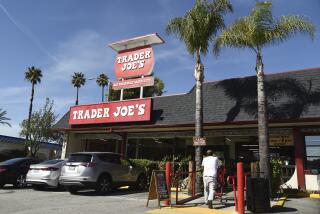Chocolate war: Hershey, Mars accused of trying to undermine cocoa farmers’ pay

A fight between the world’s top cocoa producers and America’s largest chocolate makers is getting worse.
Ivory Coast and Ghana, which account for about 70% of the world’s supply, accused Hershey Co., the maker of Kisses and Reese’s peanut butter cups, of squeezing the futures market in an effort to avoid paying a premium aimed at boosting farmers’ incomes, according to letters and a statement by cocoa regulators seen by Bloomberg. The countries also said Mars Inc. had changed its buying patterns for the same reason.
As a result, the countries canceled all of the sustainability programs Hershey is involved in directly or indirectly, and said companies running programs on behalf of the Pennsylvania chocolate maker will also be barred from operating them.
The accusations are a further hit to the reputations of chocolate makers, which have comeunder increasing pressure for their role in deforestation, child labor and poverty. They also underscore the uneasy, often volatile relationship between poorer nations producing the beans and companies selling the finished product to wealthier customers.
“Some chocolatiers and trade houses have adopted covert strategies to circumvent the farmer income improvement mechanism with the aim of collapsing it,” Yves Kone, managing director of Le Conseil du Cafe-Cacao, and Joseph Boahen Aidoo, chief executive of the Ghana Cocoa Board, said in a Monday statement seen by Bloomberg. They said they will do “whatever is within our power to protect the over 3 million farmers from impoverishment.”
Chocolate makers and cocoa processors had agreed to pay the West African nations a “living income differential” of $400 a ton on top of the futures market, but after the pandemic slashed demand, companies need to cut costs to weather a second wave of stay-at-home orders spanning the globe.
Last month, Hershey took the unusual step of directly sourcing its cocoa via the exchange, as the premium charged by Ghana and Ivory Coast made cocoa inventories that back futures contracts in New York more attractive. The move upended the cocoa market on ICE Futures U.S., with December futures climbing to a record over March.
In a Monday letter to Hershey, Ivory Coast and Ghana accused the company of “conspiracy and machinations,” saying the use of the exchange was a clear indication of Hershey’s intention to avoid paying the living income differential.
Failure to comply with the orders would mean companies could lose their licenses to operate in the countries, they added.
The spat is also a risk for Ivory Coast and Ghana, which still have a lot of their crops to sell, said Judy Ganes, president of J. Ganes Consulting, who has followed markets for more than 30 years.
Ivory Coast and Ghana have in the past threatened to suspend chocolate makers’ sustainability programs, a tactic that in the past has worked. Still, market conditions are “vastly different” now, and the countries, particularly Ivory Coast, have also failed to limit output as promised, Ganes said.
Ivory Coast’s regulator confirmed the letters and the statement. Fiifi Boafo, a spokesman for the Ghana Cocoa Board, could not immediately comment when reached by phone.
The countries also accused Chicago cocoa processor Blommer Chocolate Co., which usually processes large amounts of beans for Hershey, of collaborating with Hershey, according to a separate Monday letter sent to the Cocoa Merchants’ Assn. of America in which the countries withdrew their membership from the group.
“We are fully participating in the [living income differential] for cocoa purchases already made from the 2020-2021 crop as we buy a substantial supply sourced from West Africa,” Hershey said in a statement. “We will continue to participate in the [living income differential] to support cocoa farmer livelihoods going forward. We look forward to further discussing this with Cote d’Ivoire and Ghana and to hopefully continue the sustainability programs that are benefiting cocoa farmers today.
“Our concern is that by cutting off industry sustainability programs, cocoa farmers will be negatively impacted as they will no longer receive the benefits provided by our on-the-ground programs as well as the price premium for certified cocoa.”
Blommer didn’t respond to a request for comment.
This year, a report sponsored by the U.S. government showed that child labor had gotten worse, a decade after the $100-billion chocolate industry pledged to reduce it.
The regulators also took aim at the maker of Twix, saying Mars had migrated the bulk of its cocoa butter purchases to its traditional processors, buying from JB Cocoa and Guan Chong Berhad instead just to avoid paying the premium. Mars said it “categorically disagrees” with the allegations and highlighted that it was the first major manufacturer to support the living income differential.
The nations also said Olam International Inc., the third-largest cocoa processor, had pursued a strategy of reducing the amount of Ghana and Ivory Coast beans from its recipes. The Singapore trader reiterated its “strong support” for farmers and boosting their incomes, in line with the objectives of the living income differential.
“As one of the largest buyers of cocoa from Côte d’Ivoire and Ghana, our commitment is unwavering and we continue to support and purchase cocoa from both countries,” said Gerry Manley, head of cocoa at Olam.
The cocoa regulators also said that they were reviewing their membership in the Federation of Cocoa Commerce in London and that they are “reconsidering the incentives and the licenses granted to members of the FCC which are directly or subtly rejecting” the living income differential.
“Ivory Coast and Ghana might be sending a stern warning to the trade, but they also need to be able to sell their cocoa, of which they have plenty,” said Ganes, who previously worked for Wall Street giant Merrill Lynch. “This is a stare-down for sure, with gloves off, and will be interesting to see who blinks first.”
Almeida, Mieu and De Bassompierre write for Bloomberg.






